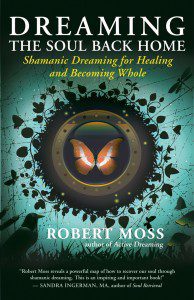When we suffer trauma or bitter disappointment or violent shock, soul may leave the body, to escape. This produces the phenomenon that psychologists call dissociation and shamans call soul loss. It can be seen as a survival mechanism. When you can’t take any more pain, you go away in order to make it through.
A child who has been abused, a survivor grieving for a beloved partner who has died, a lover who has been betrayed and abandoned, a soldier who is shell-shocked, and the victim of a terrible accident are all likely to have suffered major soul loss.
Let’s notice that soul loss need not be major, or the result of violent events. We suffer a lesser degree of soul loss when we choose one direction in life over another, or when we put our energy and focus into one thing rather than another – like holding down the job instead of pursuing a creative project, or being a mom instead of a lover (or vice versa). Soul loss may be merely temporary and transitional “soul drift”, as when we are jet-lagged and it takes a while for us to catch up with ourselves.
- What are the symptoms of soul loss?
Common symptoms of soul loss include: chronic fatigue; emotional numbness; chronic depression; spaciness; addictive behaviors; low self-esteem; inability to let go of past situations or people no longer in your life; dissociation and multiple personality disorder; obesity or unexplained weight gain; abusive behaviors; absence of dream recall; recurring dreams of locations from earlier life, or of a self separate from your present self.
- What is the difference, in a practical sense, between someone with a lot of soul in their bodies and someone who does not?
For people with a lot of soul, or vital energy, in their bodies, most of the symptoms of soul-loss listed above would be rare, transient, or absent. For someone who has suffered significant soul loss, three or more of these symptoms are likely to be chronic.
- Why does the soul have a hard time staying in the body?
We suffer pain or abuse, grief or shame, and part of us finds the world so cruel that we want to go away. Soul loss is also caused by wrenching life choices: we decide to leave a relationship, a home, a job, a country, a lifestyle — but part of us resists that choice, sometimes to the point of splitting away and withdrawing its energy from our lives. We also lose soul energy when we give up on our dreams and settle for a life of dull compromise, refusing to trust ourselves to love or to take that creative leap.
- Where does soul go when it leaves?
Sometimes we find that a part of ourselves is stuck in the old place, in Granma’s house, or in the apartment we shared with our first love. Sometimes a soul part we lost seems to be living in a separate reality, like the land of the Lost Boys in Peter Pan. When we wish ourselves dead, a part of our soul may go far way, as far as a Land of the Dead.
- Are all aspects of soul recoverable?
There are parts that are so damaged we don’t want them back. Sometime they appear burned or charred, dark or addicted. Sometimes our life choices are so radical that a part of ourselves simply cannot be persuaded to share our present situation. My inner businessman is quite disgusted with the choices I have made, and won’t stay close to me unless I make money more of a priority than I am likely to do!
- What is the first step that someone who would like to experience more soul in their life to take?
You do some cleanup, and you ask for help. In the book, as in my retreats, I offer practical guidance for psychic cleansing and release. One of my favorites is a very simple fire releasing in which we cast out any heavy energies that are holding us back and clear a space for vital soul to come back in. It’s very important to remember that we have help available, including from our spiritual allies and our own Greater Self, and that it’s always a good idea to ask for help nicely.
- What role does addiction play in soul loss?
Addiction can be both a cause and an effect of soul loss. Part of our brighter energy may leave us if we fall into habits and company it doesn’t like. When we are missing a part of ourselves, things come in to fill the gap, and we reach for things to fill that gap. From a shamanic viewpoint, addictions are often worsened by spirits of the dead who are seeking to feed their own cravings through a living person. I have never met a true alcoholic, for example, who has not (from my viewpoint) been accompanied by dead drunks. In the book, as in my programs, I offer practical guidance to create healthy psychic boundaries between the living and the deceased.
- What is the difference between spirit and soul?
We can’t lose spirit, when the term means mind, higher consciousness or our spark of the Godhead. But we can lose contact with it, and block our own access to the Greater Self. Soul is a different matter. Soul is quite mobile and soul energy is divisible; we can lose parts of it and take on parts from others that we really don’t want around.
- You have developed an original approach to healing through what you call “soul recovery”. What are the key elements in this approach?
We use the core techniques of Active Dreaming to bring more of soul into the body and help others to become whole. By learning to share dreams with others in the right way, we create a safe space where our younger and brighter selves can draw closer, and we start to build communities of soul friends. By learning to use a dream as a doorway through which we can travel — in shamanic lucid dreaming — into a deeper space, we can go to the places where lost souls can be found and reclaimed, and we help each other to do this.
- Are there other ways, in addition to working with our dreams, to experience soul recovery? If so, what are they?
Soul retrieval, as opposed to soul recovery is a shamanic operation in which the practitioner makes a journey on behalf of a client to locate lost aspects of soul, brings them back, and transfers them to the client’s body, often by blowing them into energy centers such as the heart and the crown of the head. It can be a profoundly healing event. It reaches parts that Western psychology often does not reach, and may be essential in cases where people are missing so much of themselves that they are not equipped to become self-healers until an intervention has taken place. The limitation of this is approach is that nearly everything depends on the character and skill of the practitioner, on the reality of his or her connection with spirit helpers, and on the quality and motivation of those helpers.
- You say that dreams not only show us what the soul wants, they also show us where it has gone. Please elaborate and provide an example of this.
Our dreams can tell us which parts of ourselves may be missing, and when it is timely to bring them home. Recurring dreams in which we go back to a scene from our earlier lives may indicate that a part of us has remained there. Dreams in which we perceive a younger self as a separate individual may be nudging us to recognize and recover a part of ourselves we lost at that age. Sometimes we do not know who that beautiful child is – until we take a closer look.
A middle-aged woman approached me for help. She told me, “I feel I have lost the part of me that can give trust and know joy.” As preparation for our meeting, I asked her to start a dream journal, although she had told me she had not remembered her dreams for many years. When she came to see me, she had succeeded in capturing just one tiny fragment from a dream. She remembered that she was standing over a table, looking at three large-size “post-it” notes. Each had a typed message. But the ink had faded and she could not read the messages.
Slowly and carefully, I helped her to relax and encouraged her to try to go back inside her dream. Quite quickly, she found herself inside a room in the house where she had lived with her ex-husband prior to their divorce, almost twenty years before. Now she could read the typed messages. The first read in bold capitals, “YOU CAN DO IT.” They were all about living with heart, and trusting life.
She realized that she had left her ability to love and to trust in that room for nearly twenty years. I asked her what she needed to do. She told me, “I need to bring my heart out of that room and put it back in my body.” She gathered up the messages and made the motion of bringing them into her heart. As her hands crossed over the place of her heart, we both saw a sweet and gentle light shine out from her heart center. She trembled, eyes shining, and told me, “Something just came back. Something that was missing for twenty years.”


